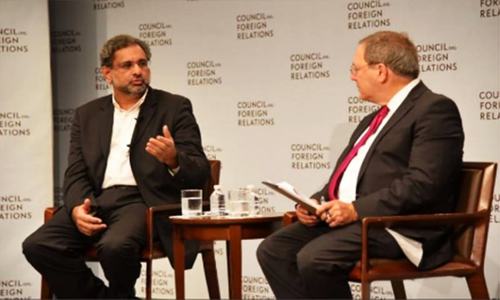A SERIES of sharply worded comments about Pakistan by officials in US President Donald Trump’s administration has elicited a sharp reaction from this country.
On Thursday, DG ISPR Maj Gen Asif Ghafoor delivered a tough message to the US, effectively warning that any so-called unilateral actions inside Pakistan by the US would be met with an emphatic response.
The rhetorical escalation between the US and Pakistan is undesirable and unnecessary — and both sides ought to consider reassessing their approach at the moment.
The Trump administration’s hardening stance against Pakistan is particularly egregious. In power for less than a year, the administration’s so-called South Asia strategy was only revealed last summer.
Also read: America urges Pakistan to prove responsible stewardship of nukes
The core of the strategy is a renewed emphasis on military power inside Afghanistan to try and roll back the gains the Afghan Taliban have made in recent years.
The notion that alleged Pakistani sanctuaries or support for the Afghan Taliban is the principal reason for the latter’s relative strength inside Afghanistan has always been preposterous.
It is even more preposterous when failures of the Afghan state, both political and military, are taken into account.
Clearly, sanctuaries are a problem. Pakistan’s insistence that sanctuaries for anti-Pakistan militants in Afghanistan is preventing the country from fully defeating the banned TTP and affiliated groups suggests that the opposite too could be true.
But in the vexed triangular relationship between the US, Pakistan and Afghanistan, common sense and the common good have mostly proved to be elusive.
With China, Russia and Iran seeking to expand their role in the Afghan security situation, balancing competing interests is likely to become more difficult. Arguably, Afghanistan, Pakistan and the US have the most to gain from a relatively stable and peaceful Afghanistan and should find ways to address their common security challenges.
The Kabul bombing on Thursday was yet another bloody reminder of the complexity of the militant threat in the region.
The militant Islamic State group is an undeniable actor in the region and a threat to all states. Dismantling its infrastructure and eliminating its network is an urgent priority.
Arguably, the more Pakistan, Afghanistan and the US find ways to disagree, the more IS benefits.
If there has been any lesson regarding stability and cooperation in the region, it has been that public pressure often has the opposite effect to what is intended. The mercurial Trump presidency combined with Afghanistan’s political uncertainty is surely contributing negatively to the pursuit of peace in the region.
The strong response of the Pakistani state to the recent threatening comments of senior US officials should not be interpreted as mere verbal sparring.
All sides need to return to diplomacy to find cooperative solutions or ways to disagree without roiling the region.
Published in Dawn, December 30th, 2017












































